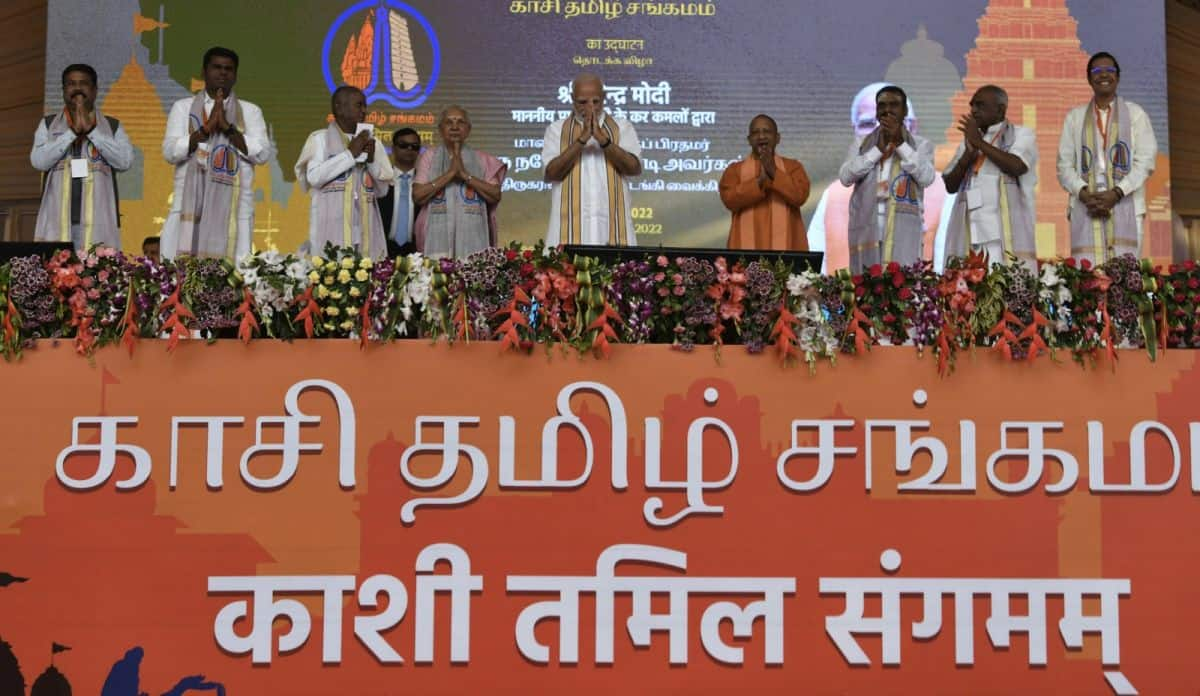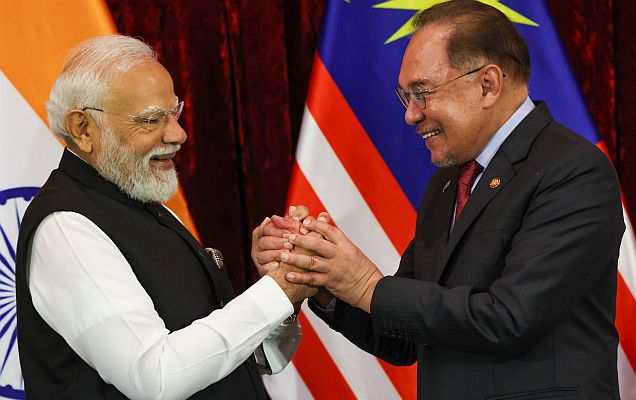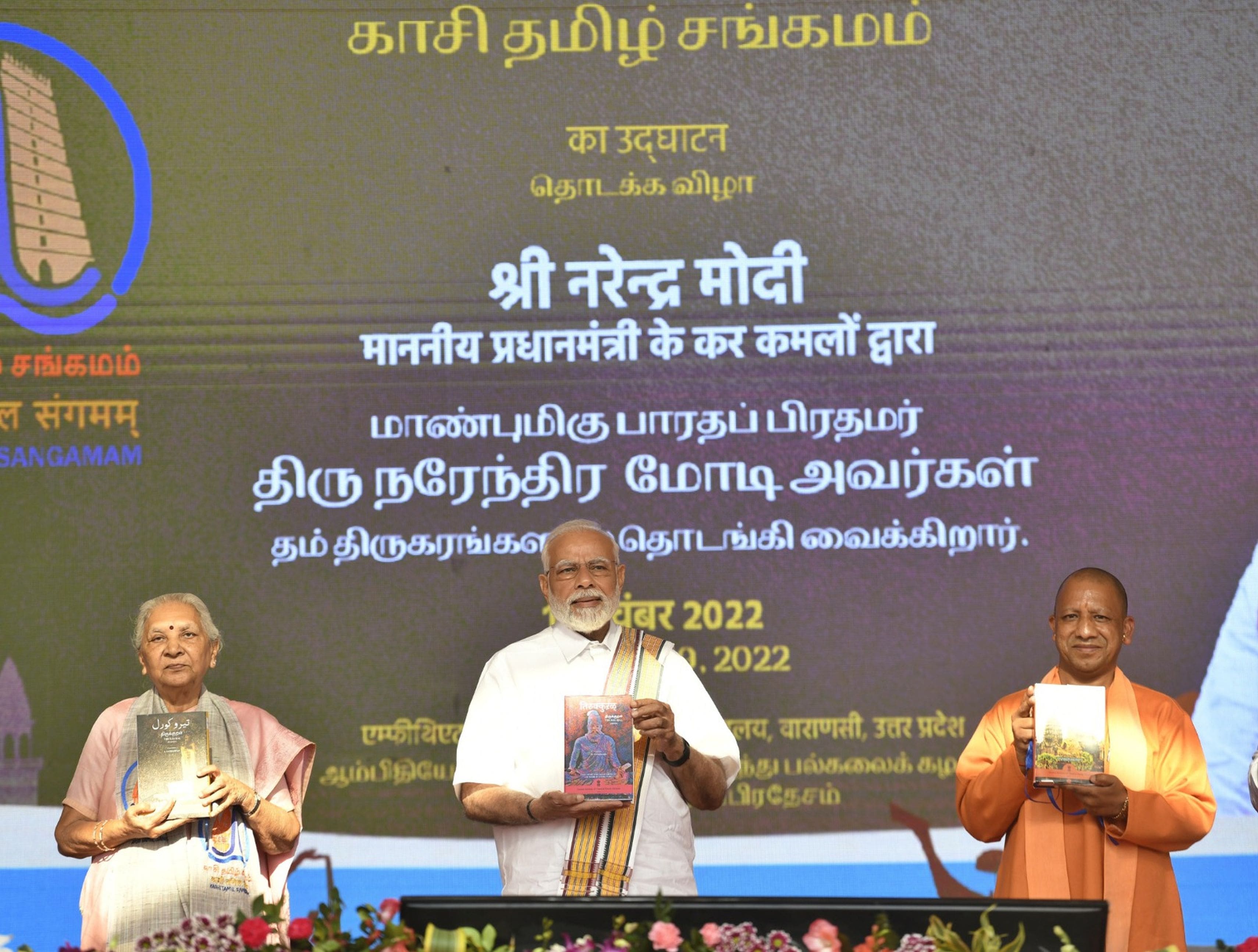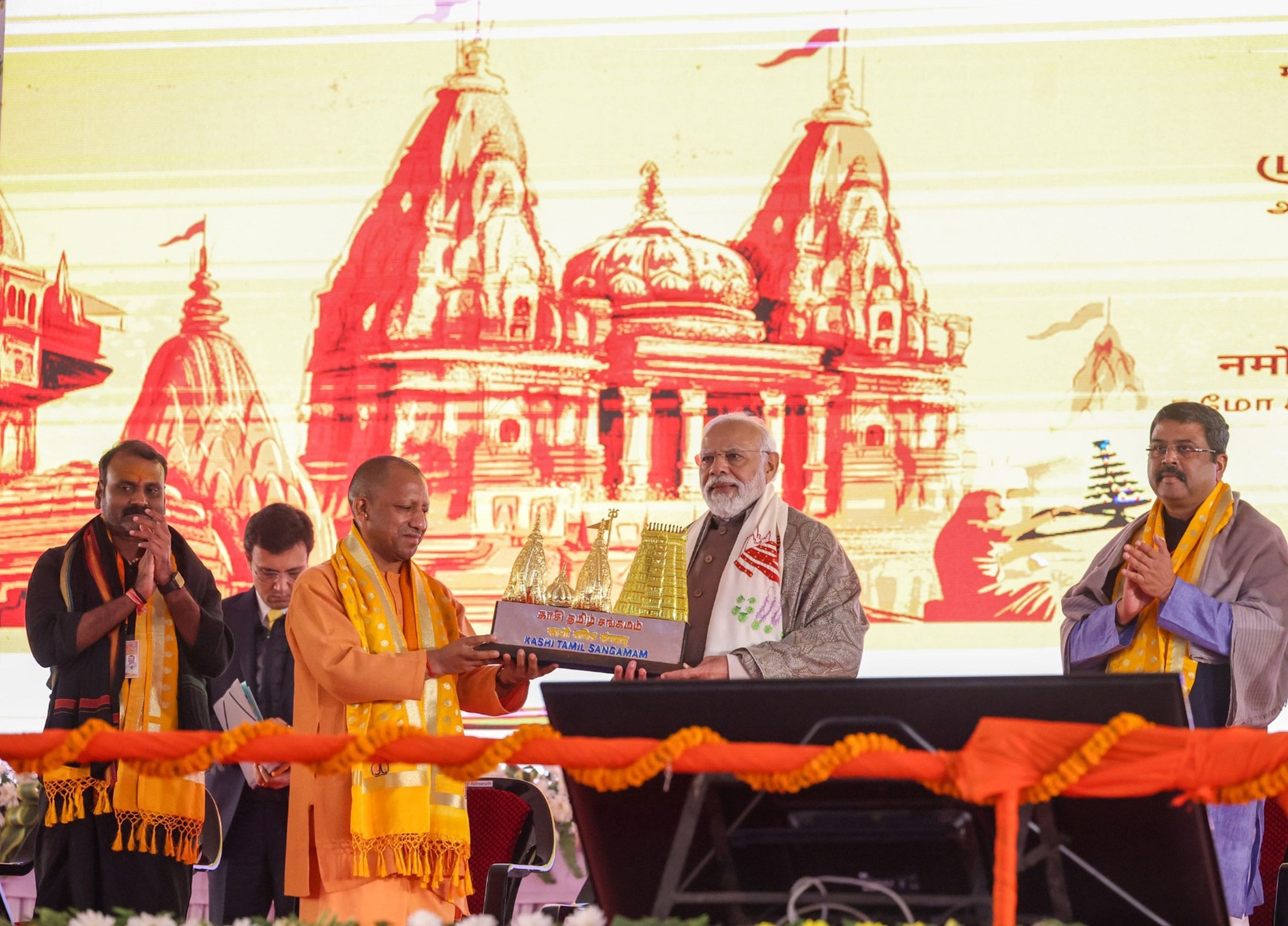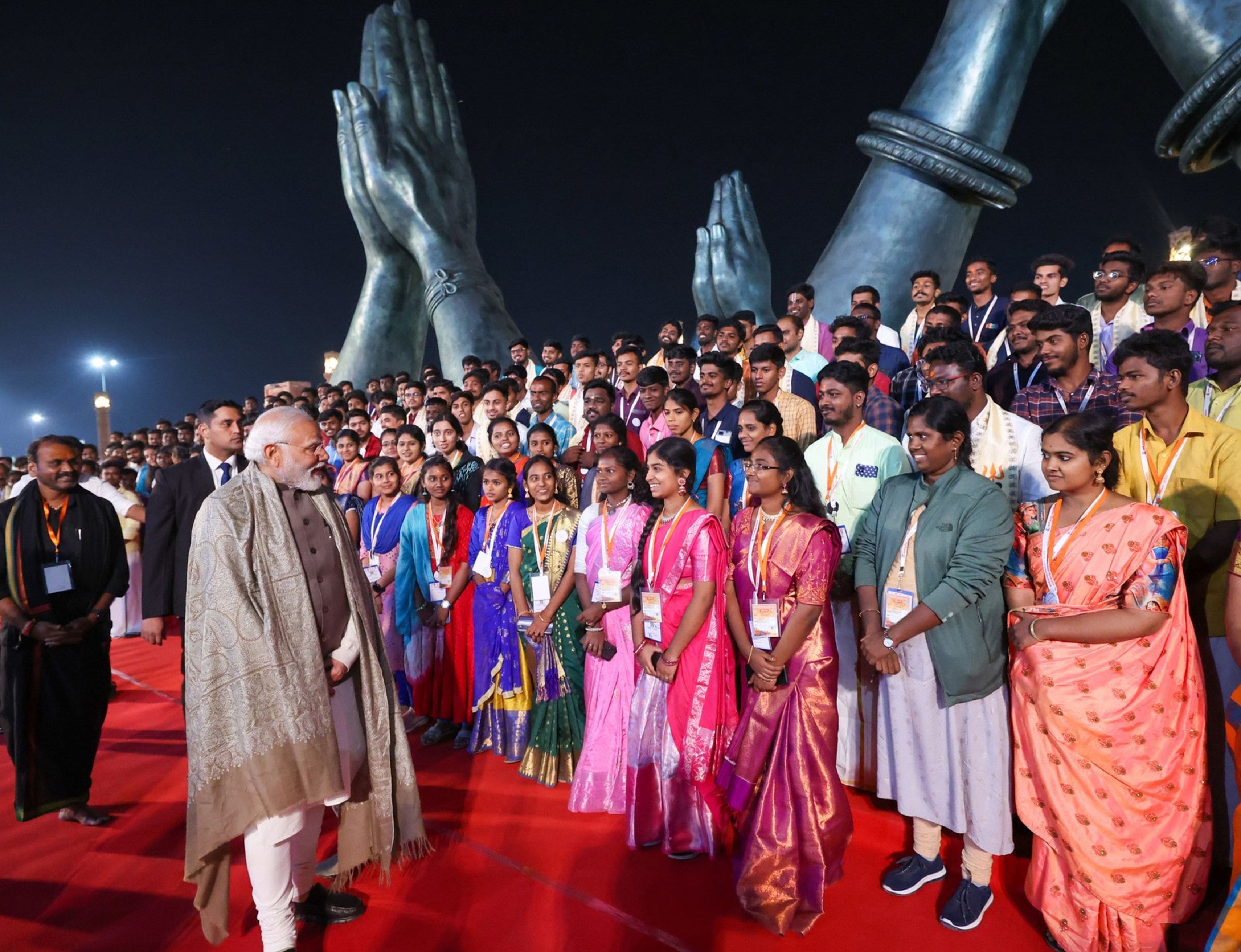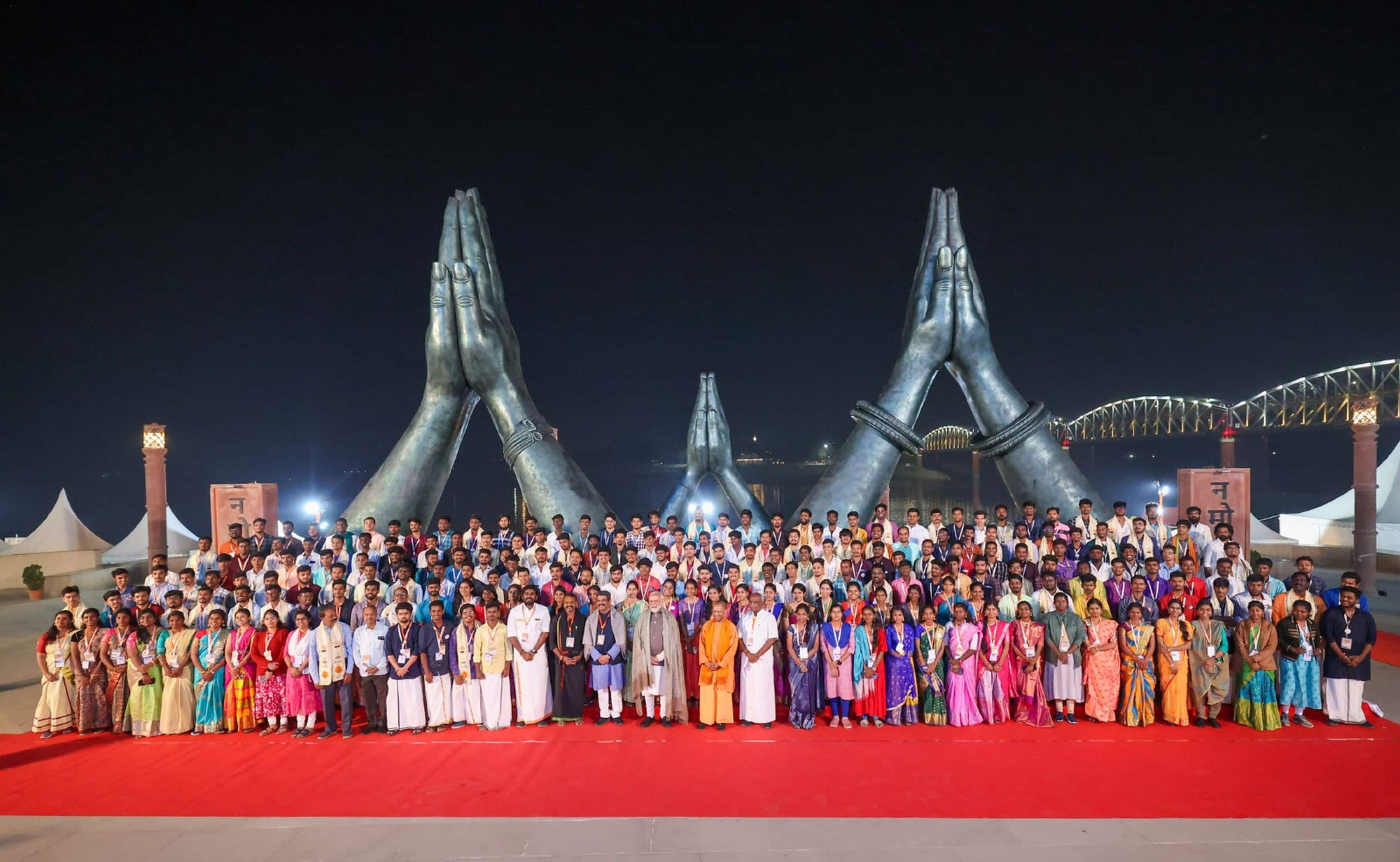Mother – is not just any other word in the dictionary. It encompasses a whole range of emotions – love, patience, trust, and a lot more. Across the world, irrespective of country or region, children have a special affection for their mothers. A mother not only gives birth to her children, but also shapes their mind, their personality, and their self-confidence. And while doing so, mothers selflessly sacrifice their own personal needs and aspirations.
Today, I feel extremely happy and fortunate to share that my mother Smt. Heeraba is entering her hundredth year. This is going to be her birth centenary year. If my father had been alive, he too would have celebrated his 100th birthday last week. 2022 is a special year as my mother’s centenary year is starting, and my father would have completed his.
Just last week, my nephew shared a few videos of Mother from Gandhinagar. A few youngsters from the society had come home, my father’s photograph was kept on a chair, there was a kirtan, and Mother was immersed in singing bhajans while playing the manjeera. She is still the same - age may have taken a toll physically, but she is as mentally alert as ever.
Earlier, there was no custom of celebrating birthdays in our family. However, children from the younger generations planted 100 trees to remember my father on his birthday.
I have no doubt that everything good in my life, and all that is good in my character, can be attributed to my parents. Today, as I sit in Delhi, I am filled with memories from the past.
My Mother is as simple as she is extraordinary. Just like all mothers! As I write about my Mother, I am sure that many of you would relate to my description of her. While reading, you may even see your own mother’s image.
A mother’s penance creates a good human being. Her affection fills a child with human values and empathy. A mother is not an individual or a personality, motherhood is a quality. It is often said that the Gods are made according to the nature of their devotees. Similarly, we experience our mothers and their motherhood according to our own nature and mindset.
My Mother was born in Visnagar in Mehsana in Gujarat, which is quite close to my hometown Vadnagar. She did not get her own mother’s affection. At a tender age, she lost my grandmother to the Spanish Flu pandemic. She does not even remember my grandmother’s face or the comfort of her lap. She spent her entire childhood without her mother. She could not throw tantrums at her mother, as we all do. She could not rest in her mother’s lap like we all do. She could not even go to school and learn to read and write. Her childhood was one of poverty and deprivation.
Compared to today, Mother's childhood was extremely difficult. Perhaps, this is what the Almighty had destined for her. Mother also believes that this was God’s will. But losing her mother early in her childhood, the fact that she couldn’t even see her mother’s face, continues to give her pain.
Mother did not have much of a childhood due to these struggles – she was forced to grow beyond her age. She was the eldest child in her family and became the eldest daughter-in-law after marriage. In her childhood, she used to take care of the entire family and manage all the chores. After marriage too, she picked up all these responsibilities. Despite the onerous responsibilities and everyday struggles, Mother held the entire family together with calm and fortitude.
In Vadnagar, our family used to stay in a tiny house which did not even have a window, let alone a luxury like a toilet or a bathroom. We used to call this one-room tenement with mud walls and clay tiles for a roof, our home. And all of us - my parents, my siblings and I, stayed in it.
My father made a machaan from bamboo sticks and wooden planks to make it easier for Mother to cook food. This structure was our kitchen. Mother used to climb on the machaan to cook, and the entire family would sit on it and eat together.
Usually, scarcity leads to stress. However, my parents never let the anxiety from the daily struggles overwhelm the family atmosphere. Both my parents carefully divided their responsibilities and fulfilled them.
Like clockwork, my father used to leave for work at four in the morning. His footsteps would tell the neighbours that it is 4 AM and Damodar Kaka is leaving for work. Another daily ritual was to pray at the local temple before opening his little tea shop.
Mother was equally punctual. She would also wake up with my father, and finish many chores in the morning itself. From grinding grains to sifting rice and daal, Mother had no help. While working she would hum her favourite bhajans and hymns. She loved a popular bhajan by Narsi Mehta Ji - ‘Jalkamal chhadi jane bala, swami amaro jagse’. She also liked the lullaby, ‘Shivaji nu halardu’.
Mother never expected us, children, to leave our studies and assist her with the household chores. She never even asked us for help. However, looking at her work so hard, we considered helping her our foremost duty. I used to really enjoy swimming in the local pond. So, I used to take all the dirty clothes from home and wash them at the pond. The washing of clothes and my play, both used to get done together.
Mother used to wash utensils at a few houses to help meet the household expenses. She would also take out time to spin the charkha to supplement our meagre income. She would do everything from peeling cotton to spinning yarn. Even in this back-breaking work, her prime concern was ensuring that the cotton thorns don’t prick us.
Mother avoided depending on others or requesting others to do her work. Monsoons would bring their own troubles for our mud house. However, Mother ensured that we faced minimum discomfort. In the searing heat of June, she would clamber over the roof of our mud house and repair the tiles. However, despite her valiant efforts, our house was too old to withstand the onslaught of the rains.
During the rains, our roof would leak, and the house would flood. Mother would place buckets and utensils below the leaks to collect the rainwater. Even in this adverse situation, Mother would be a symbol of resilience. You will be surprised to know that she’d use this water for the next few days. What better example than this of water conservation!
Mother was fond of decorating the house and would devote considerable time towards cleaning and beautifying it. She would smear the floor with cow dung. Cow dung cakes emit a lot of smoke when burnt. And Mother would cook with them in our windowless house! The walls would get blackened by soot and require fresh whitewashing. This too Mother would do herself every few months. This would give our dilapidated home a scent of freshness. She would also make pretty little clay bowls to decorate the house. And she was a champion in the famous Indian habit of recycling old household items.
I can recall another unique habit of Mother. She would make a glue-like paste with old paper dipped in water and tamarind seeds. She would make beautiful paintings by sticking mirror pieces on the walls with this paste. She would get small decorative items from the market to hang on the door.
Mother was extremely particular that the bed should be clean and properly laid out. She would not tolerate even a speck of dust on the bed. A slight crease meant that the bed sheet would be dusted and laid again. All of us were very careful about this habit as well. Even today, at this age, Mother expects that there should not be a single crease on her bed!
This striving for perfection prevails even now. And though she stays with my brother’s and my nephew’s families in Gandhinagar, she still tries to do all her work herself at this age.
Her focus on cleanliness is evident even today. Whenever I go to Gandhinagar to visit her, she offers me sweets with her own hands. And just like a young child’s doting mother, she takes out a napkin and wipes my face once I finish eating. She always has a napkin or small towel tucked into her saree.

I can fill many reams of paper recalling anecdotes about Mother’s focus on cleanliness. She had another quality - a deep respect for those involved in cleaning and sanitation. I remember, whenever someone would come to clean the drain adjacent to our house in Vadnagar, Mother wouldn’t let them go without giving them tea. Our house became famous amongst safai karamcharis for tea after work.
Another habit of Mother that I always remember is her special affection for other living beings. Every summer, she would put out water vessels for the birds. She ensured that stray dogs around our house never went hungry.
Mother would make delicious ghee from the cream that my father would bring back from his tea shop. And this ghee was not just for our consumption. The cows in our neighbourhood too were entitled to their share. Mother would feed rotis to the cows every day. And rather than just giving dry rotis, she would spread them with homemade ghee and love.
Mother insisted on not wasting a single grain of food. Whenever there was a wedding feast in our neighbourhood, she would remind us to not waste any food. There was a clear rule in the house - only take as much as you can eat.
Even today, Mother takes only as much food in the thali as she can eat and doesn’t waste even a morsel. A creature of habit, she eats on time and chews her food to digest it properly.

Mother would find happiness in other people’s joys. Our house may have been small, but she was extremely large-hearted. A close friend of my father used to stay in a nearby village. After his untimely death, my father brought his friend’s son, Abbas, to our home. He stayed with us and completed his studies. Mother was as affectionate and caring towards Abbas just like she did for all of us siblings. Every year on Eid, she used to prepare his favourite dishes. On festivals, it was commonplace for neighbourhood kids to come to our house and enjoy Mother’s special preparations.
Whenever a Sadhu visited our neighbourhood, Mother would invite them to our humble home for a meal. True to her selfless nature, she would request the Sadhus to bless us children rather than asking anything for herself. She would urge them, “Bless my children so that they are happy in others’ joys and empathetic in their sorrows. Let them have bhakti (devotion for the Divine) and sevabhav (service to others).”
Mother has always had immense confidence in me and the samskaras she imparted. I recall a decades-old incident when I worked in the organisation side. I was extremely busy with organisational activities and could hardly get in touch with my family. During that period, my elder brother took Mother to Badrinath Ji and Kedarnath Ji. Locals in Kedarnath Ji came to know that my mother would be visiting once she completed Darshan in Badrinath Ji.
However, the weather suddenly took a turn for the worse. Some people came downhill with blankets. They kept asking elderly women on the roads whether they were Narendra Modi’s mother. Finally, they met Mother, and gave her blankets and tea. They made comfortable arrangements for her stay in Kedarnath Ji. This incident made a deep impression on Mother. When she met me later, she said, “It seems you are doing some good work, as people recognise you.”
Today, many years later, whenever people ask her if she is proud that her son has become the country’s Prime Minister, Mother gives an extremely deep response. She says, “I am as proud as you are. Nothing is mine. I am a mere instrument in the plans of God.”
You might have noticed that Mother never accompanies me for any government or public programme. She has accompanied me on only two occasions in the past. Once, it was at a public function in Ahmedabad when she applied tilak on my forehead after I had returned from Srinagar where I had hoisted the national flag at Lal Chowk completing the Ekta Yatra.

That was an extremely emotional moment for Mother because a few people had died in a terror attack in Phagwara at the time of the Ekta Yatra. She became extremely worried at that time. Two people then called to check on me. One was Shraddhey Pramukh Swami of Akshardham Temple, and the second was Mother. Her relief was palpable.

The second instance is when I first took oath as Gujarat’s Chief Minister in 2001. The oath-taking ceremony held two decades ago was the last public event that Mother attended with me. Since then, she has never accompanied me to a single public event.

I remember another incident. When I became the Chief Minister in Gujarat, I wanted to publicly honour all my teachers. I thought that Mother had been my biggest teacher in life, and I should also honour her. Even our scriptures mention that there is no bigger guru than one’s mother - ‘Nasti matr samo guruh’. I requested Mother to attend the event, but she declined. She said, “See, I am an ordinary person. I may have given birth to you, but you have been taught and brought up by the Almighty.” All my teachers were felicitated that day, but for Mother.

In addition, before the event, she inquired if anybody from our local teacher Jethabhai Joshi Ji’s family would attend the event. He had overseen my early learning and even taught me the alphabet. She remembered him and knew that he had passed away. Though she did not come to the event, she made sure that I called someone from Jethabhai Joshi Ji’s family.
Mother made me realise that it is possible to be learned without being formally educated. Her thought process and farsighted thinking have always surprised me.
She has always been very aware of her duties as a citizen. Right from the time elections began, she has voted in every election, from Panchayat to Parliament. A few days ago, she had also gone out to vote in the Gandhinagar Municipal Corporation elections.
She often tells me that nothing can happen to me as I have blessings from both the public and the Almighty. She reminds me that leading a healthy lifestyle and ensuring personal well-being are necessary if I want to continue to serve the people.
Earlier, Mother would strictly follow the Chaturmaas rituals. She also knows my own personal habits during Navratri. Now, she has started telling me that I should ease these strict personal rules as I have followed them for quite a long time.
I have never heard Mother complain about anything in life. Neither does she complain about anyone, nor does she keep any expectations from anyone.
Even today, there are no assets in Mother’s name. I have never seen her wear any gold ornaments, and she has no interest either. Like earlier, she continues to lead an extremely simple lifestyle in her small room.
Mother has immense faith in the Divine, but at the same time, she remained afar from superstitions and inculcated the same qualities in us. She has traditionally been a Kabirpanthi and continues to follow those customs in her daily prayers. She spends a lot of time doing japa with her mala of beads. Engrossed in daily worship and japa, she often ends up even forgoing sleep. Sometimes, my family members hide the prayer beads so that she falls asleep.
Despite her advanced age, Mother has a good memory. She remembers decades-old incidents vividly. Whenever some relatives visit her, she immediately recalls their grandparents’ names and identifies them accordingly.
She keeps herself abreast of developments in the world. Recently, I asked her how long she watches TV every day. She replied that most people on TV are busy fighting with each other, and she only watches those who calmly read out the news and explain everything. I was pleasantly surprised that Mother keeps track of so much.
I recall another incident relating to her sharp memory. In 2017, after campaigning in Kashi for the Uttar Pradesh assembly elections, I went to Ahmedabad. I carried some Prasad for her. When I met Mother, she immediately asked me if I had paid obeisance to Kashi Vishwanath Mahadev. Mother still uses the full name - Kashi Vishwanath Mahadev. Then during the conversation, she asked me if the lanes that lead to the Kashi Vishwanath Temple are still the same, as if there is a temple inside someone’s household premises. I was surprised and asked when she visited the temple. She revealed that she had gone to Kashi many years back, but surprisingly remembered everything.

Mother is not only extremely sensitive and caring but also quite talented. She knows innumerable home remedies for treating young children. At our Vadnagar home, every morning, there used to be queues of parents bringing their infants for examination and treatment.
She often required a very fine powder for treatment. Collecting this powder was a collective responsibility of us children. Mother would give us ash from the stove, a bowl, and a fine cloth. We used to tie the cloth on the bowl and place some ash on it. Then we would slowly rub the ash on the cloth, so that only the finest granules would get collected in the bowl. Mother would tell us, “Do your work well. The children should not be troubled by bigger pieces of ash.”
I can recall another instance that reflects Mother’s innate affection and presence of mind. Once, our family had gone to the Narmada ghat for a puja that my father wished to conduct. To avoid the gruelling heat, we left in the early morning for the three-hour journey. After getting off, there was still some distance that had to be covered on foot. As it was extremely hot, we started walking in the water along the riverbank. It is not easy to walk in the water, and soon we became tired and, also hungry. Mother noticed our discomfort immediately and asked my father to stop and rest for a while. She also asked him to go and buy jaggery from somewhere nearby. He went running and managed to get it. The jaggery and water gave us instant energy, and we started walking again. Going for puja in that debilitating heat, Mother’s alertness, and my father swiftly bringing jaggery, I distinctly remember each of those moments.
Since childhood, I have noted that Mother not only respects others’ choices but also refrains from imposing her preferences. In my own case especially, she respected my decisions, never created any hurdles, and encouraged me. Since childhood, she could feel that a different mindset grew inside me. I used to be slightly different compared to my brothers and sisters.
She often had to make special efforts to accommodate the special needs of my distinct habits and unusual experiments. However, she never considered this a burden and never expressed any irritation. For instance, I would often abstain from salt for a few months, or refrain from consuming any grains for a few weeks only having milk. Sometimes, I would decide to avoid sweets for six months. In winters, I would sleep in the open and bathe with cold water from an earthen pot. Mother knew that I was testing myself and did not object to anything. She would just say, “It’s alright, do as you please”

She could sense that I was going in a different direction. Once, a Mahatma had come to the Giri Mahadev temple close to our home. I started serving him with great devotion. Around that time, Mother was extremely excited about her sister’s upcoming wedding, especially as it was an opportunity to visit her brother’s home. However, while the entire family was busy preparing for the wedding, I went and told her that I did not wish to go. She asked me for a reason, and I explained about my service to the Mahatma.
Naturally, she was disappointed that I was not going to attend her sister’s wedding, but she respected my decision. She said, “It’s alright, do as you wish” However, she was worried about how I would manage to stay alone at home. She cooked food and snacks that would last a few days for me before leaving so that I wouldn’t go hungry!
When I decided to leave home, Mother already sensed my decision even before I told her. I would often tell my parents that I wanted to go out and understand the world. I would tell them about Swami Vivekananda and mention that I wished to visit the Ramakrishna Mission Mutt. This went on for days.
Finally, I revealed my desire to leave home and asked them for their blessings. My father was extremely disheartened, and in irritation, he told me, “As you wish”. I told them that I would not leave home without their blessings. However, Mother understood my desires, and blessed me, “Do as your mind says.” To assuage my father, she asked him to show my horoscope to an astrologer. My father consulted a relative who knew astrology. After studying my horoscope, the relative remarked, “His path is different. He will go only on the path the Almighty has chosen for him.”
A few hours later, I left home. By then, even my father had come to terms with my decision and gave me his blessings. Before leaving, Mother fed me curd and jaggery, for an auspicious new beginning. She knew that my life would become extremely different henceforth. Mothers may be extremely adept at controlling their emotions but always find it hard when their child leaves home. Mother was teary eyed but there were immense blessings for my future.
Once I left home, her blessings were the only constant that remained with me irrespective of where I was and how I was. Mother always speaks with me in Gujarati. In Gujarati, ‘tu’ is used to say ‘you’ to those who are younger or equal. If we wish to say ‘you’ to someone older or senior, we say ‘tamé’. As a child, Mother would always address me as ‘tu’. However, once I left home and embarked on a new path, she stopped using ‘tu’. Since then, she has always addressed me with ‘tamé’ or ‘aap’.
Mother has always inspired me to have a strong resolve and focus on garib kalyan. I remember when it was decided that I would be the Chief Minister of Gujarat, I was not present in the state. As soon as I landed there, I went straight to meet Mother. She was extremely ecstatic and inquired if I was going to again stay with her. But she knew my answer! She then told me, “I don’t understand your work in the government, but I just want you to never take a bribe.”
After moving to Delhi, my meetings with her are even fewer than before. Sometimes when I visit Gandhinagar, I call on her for a short while. I don’t get to meet her as often as I used to earlier. However, I have never felt any discontent from Mother over my absence. Her love and affection remain the same; her blessings remain the same. Mother often asks me “Are you happy in Delhi? Do you like it?”


She keeps assuring me that I should not worry about her and lose focus on the larger responsibilities. Whenever I speak to her on the phone, she says “Never do anything wrong or anything bad with anyone and keep working for the poor.”
If I look back at my parents’ lives, their honesty and self-respect have been their biggest qualities. Despite struggling with poverty and its accompanying challenges, my parents never left the path of honesty or compromised on their self-respect. They had only one mantra to overcome any challenge - hard work, constant hard work!
In his life, my father never became a burden on anyone. Mother too tries to ensure that - she does her own chores as much as possible.
Today, whenever I meet Mother, she always tells me “I don’t want to be served by anyone, I want to go with all my limbs working.”
In my Mother’s life story, I see the penance, sacrifice, and contribution of India’s matrushakti. Whenever I look at Mother and crores of women like her, I find there is nothing that is unachievable for Indian women.
Far beyond every tale of deprivation, is the glorious story of a mother,
Far above every struggle, is the strong resolve of a mother.
Ma, a very happy birthday to you.
Best wishes as you start your birth centenary year.
I have never been able to muster the courage to write at length publicly about your life until now.
I pray to the Almighty for your health and wellbeing, and your blessings on all of us.
I bow at your feet.
The blog is also available in the following Languages:
Hindi | Bengali | Gujarati | Kannada | Malayalam | Marathi | Odia | Tamil | Telugu | Assamese | Urdu | Punjabi
Please Note: NAMO App Users may kindly change the language of the App to read it in the language of your choice.






